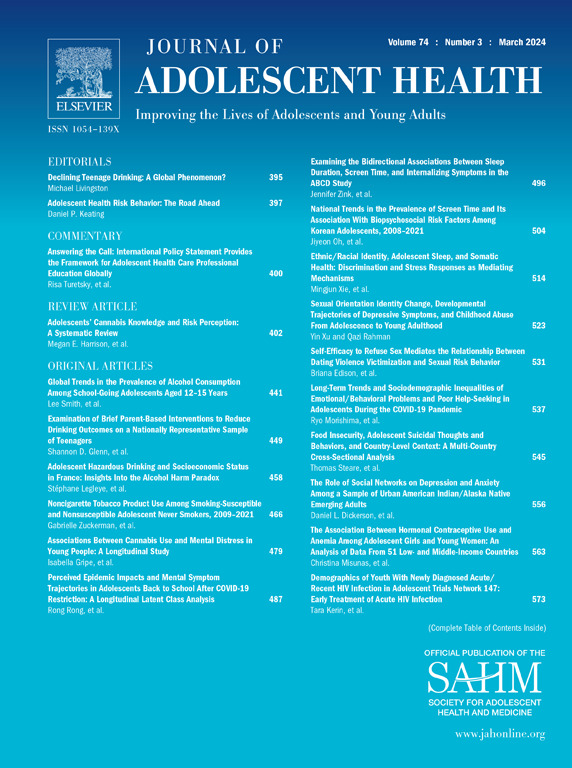Life's Essential 8 and Depression: A National Cross-Sectional Analysis in US Emerging Adults
IF 4.5
2区 医学
Q1 PEDIATRICS
引用次数: 0
Abstract
Purpose
To examine the association between adherence to Life's Essential 8 (LE8) and depression in a nationally representative sample of US emerging adults, including both overall and subgroup analyses by gender, age, and other sociodemographic factors.
Methods
Data from 2,219 emerging adults from the National Health and Nutrition Examination Survey (2007–2018) were analyzed. Depression was measured using the Patient Health Questionnaire-9, with scores ≥10 indicating depression. LE8 scores were calculated based on cardiovascular health factors, and covariates included demographic and behavioral variables. Weighted logistic regression was used to assess associations between LE8 and depression.
Results
Participants with higher LE8 scores had lower odds of depression. In the fully adjusted model, which adjusted for sociodemographic variables, the odds of depression were significantly lower in the highest quartile of LE8 adherence (odds ratio (OR) = 0.252, 95% confidence interval (CI): 0.233–0.289, p < .001) compared to the lowest quartile. Continuous LE8 scores were also inversely associated with depression (OR = 0.961, 95% CI: 0.949–0.974, p < .001). Gender-stratified analyses showed that the protective effect of higher LE8 scores was more pronounced in males (OR = 0.956, 95% CI: 0.934–0.979, p < .001) than in females (OR = 0.960, 95% CI: 0.945–0.975, p < .001).
Discussion
Better cardiovascular health, as indicated by higher LE8 scores, was strongly linked to lower depression in emerging adults. Targeted interventions promoting key behaviors like sleep and physical activity could effectively reduce depression in this population.

生活必需品与抑郁症:美国新兴成年人的全国性横断面分析。
目的:研究美国新兴成人中具有全国代表性的样本中坚持生活必需8 (LE8)与抑郁症之间的关系,包括按性别、年龄和其他社会人口因素进行总体和亚组分析。方法:对全国健康与营养调查(2007-2018)中2219名新生成人的数据进行分析。抑郁症采用患者健康问卷-9进行测量,得分≥10表示抑郁。LE8评分基于心血管健康因素计算,协变量包括人口统计学和行为变量。采用加权逻辑回归评估LE8与抑郁症之间的关系。结果:LE8得分较高的参与者患抑郁症的几率较低。在调整了社会人口变量的完全调整模型中,与最低四分位数相比,坚持LE8的最高四分位数患抑郁症的几率显著降低(优势比(OR) = 0.252, 95%可信区间(CI): 0.233-0.289, p < 0.001)。连续LE8评分也与抑郁呈负相关(OR = 0.961, 95% CI: 0.949 ~ 0.974, p < 0.001)。性别分层分析显示,较高的LE8评分对男性的保护作用(OR = 0.956, 95% CI: 0.934-0.979, p < .001)比女性(OR = 0.960, 95% CI: 0.945-0.975, p < .001)更为明显。讨论:较好的心血管健康,正如较高的LE8分数所表明的那样,与新生成人较低的抑郁症密切相关。有针对性的干预措施促进关键行为,如睡眠和体育活动,可以有效地减少这一人群的抑郁症。
本文章由计算机程序翻译,如有差异,请以英文原文为准。
求助全文
约1分钟内获得全文
求助全文
来源期刊

Journal of Adolescent Health
医学-公共卫生、环境卫生与职业卫生
CiteScore
10.40
自引率
3.90%
发文量
526
审稿时长
46 days
期刊介绍:
The Journal of Adolescent Health is a scientific publication dedicated to enhancing the health and well-being of adolescents and young adults. Our Journal covers a broad range of research topics, spanning from the basic biological and behavioral sciences to public health and policy. We welcome a variety of contributions, including original research papers, concise reports, literature reviews, clinical case reports, opinion pieces, and letters to the editor. We encourage professionals from diverse disciplines such as Anthropology, Education, Ethics, Global Health, Health Services Research, Law, Medicine, Mental and Behavioral Health, Nursing, Nutrition, Psychology, Public Health and Policy, Social Work, Sociology, and Youth Development to share their expertise and contribute to our mission of promoting adolescent health. Moreover, we value the voices of young individuals, family and community members, and healthcare professionals, and encourage them to submit poetry, personal narratives, images, and other creative works that provide unique insights into the experiences of adolescents and young adults. By combining scientific peer-reviewed research with creative expressions, our Journal aims to create a comprehensive understanding of the challenges and opportunities in adolescent and young adult health.
 求助内容:
求助内容: 应助结果提醒方式:
应助结果提醒方式:


